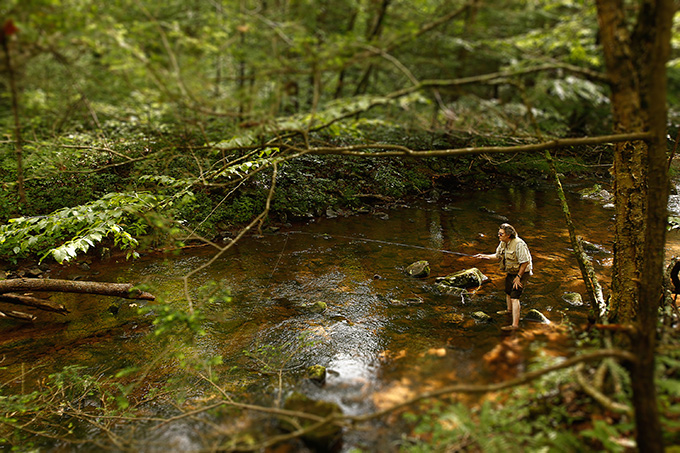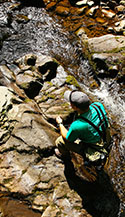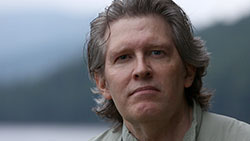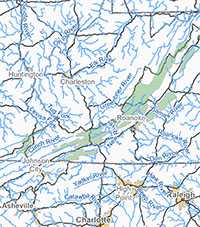As natural gas extraction expands across the Central Appalachian region, that industrial-scale energy development is encroaching on public lands that are critically important for fishing and hunting. In this report, Trout Unlimited takes a deeper look into those public places, outlining the potential risks posed by gas drilling operations and providing recommendations from sportsmen and women that promote responsible energy development.
George Washington and Jefferson National Forests

The Place
The George Washington and Jefferson national forests stretch along the heart of the picturesque Appalachian Mountains, extending the length of Virginia and crossing into parts of West Virginia and Kentucky. Approximately 80 percent of Virginia’s public hunting lands and 60 percent of the state’s brook trout streams are located here.. Home to the headwaters of eight major rivers, the George Washington and Jefferson national forests generate significant revenue from fishing and help support fisheries downstream in the Shenandoah, Potomac and James rivers and the Chesapeake Bay, contributing to Virginia’s $734 million fishing industry.
The Threat
Virginia’s shale gas region underlies more than half of the George Washington and Jefferson national forests — the largest stretch of core interior, continuous forest land in the state. About 87 percent of the Marcellus Shale acreage within the George Washington National Forest occurs in watersheds where brook trout populations are intact or have historically existed. Each phase of the drilling and fracturing process — from water withdrawals from headwater streams to erosion and sedimentation resulting from construction of new access roads, well pads, and pipelines — can potentially lead to short- and long-term impacts on trout populations.
The Need to Protect
 In its 2011 forest management plan, the U.S. Forest Service proposed a ban on horizontal drilling of federally owned mineral rights in the George Washington National Forest. Virginia sportsmen and women support the proposed ban of horizontal drilling in the George Washington National Forest and are advocating for similar policies for the neighboring Jefferson National Forest by withdrawing federal lands from future leasing where the federal government owns the mineral rights. At a minimum, sportsmen and women are urging the Forest Service to withdraw watersheds that contain high value brook trout resources from potential future leasing and to require implementation of strict standards that protect forests, fish, wildlife and water on forest lands where the oil and gas rights are privately owned. Such requirements should include: establishing setbacks from waterways, limiting the amount of surface disturbance and requiring re-vegetation as quickly as possible with native plants, shrubs and trees. Pre- and post-construction stormwater management plans should be adopted for all access roads and well pad development that include proven measures to limit stormwater runoff and sedimentation from entering streams.
In its 2011 forest management plan, the U.S. Forest Service proposed a ban on horizontal drilling of federally owned mineral rights in the George Washington National Forest. Virginia sportsmen and women support the proposed ban of horizontal drilling in the George Washington National Forest and are advocating for similar policies for the neighboring Jefferson National Forest by withdrawing federal lands from future leasing where the federal government owns the mineral rights. At a minimum, sportsmen and women are urging the Forest Service to withdraw watersheds that contain high value brook trout resources from potential future leasing and to require implementation of strict standards that protect forests, fish, wildlife and water on forest lands where the oil and gas rights are privately owned. Such requirements should include: establishing setbacks from waterways, limiting the amount of surface disturbance and requiring re-vegetation as quickly as possible with native plants, shrubs and trees. Pre- and post-construction stormwater management plans should be adopted for all access roads and well pad development that include proven measures to limit stormwater runoff and sedimentation from entering streams.
SPORTSMEN IN THE SPOTLIGHT
We need to make sure that the decisions that are made about this land are made in such a way that this is going to be here for my grandkids." Graham Simmerman, Chair of the Virginia Council of TU

If You Go
These two forests cut a wide swath of wild mountain country through Virginia. Such a wide swath, in fact that we chose to feature two TU Business members to visit there. The first is Dunburn Farms Bed and Breakfast in Glade Spring, VA. This is a luxury bed and breakfast inn designed to evoke the feeling of a Scottish hunting and fishing lodge. Enjoy fishing on one of the top 100 trout streams in America, mountain biking, skeet shooting or hiking. If you love the outdoors, this TU Business member can take you there. Contact John Lentz at (276) 475-5667 or visit www.dunburnfarms.com
View the Dunburn Farms Bed and Breakfast TU Business page
View the Matt Miles Fly Fishing TU Business page


